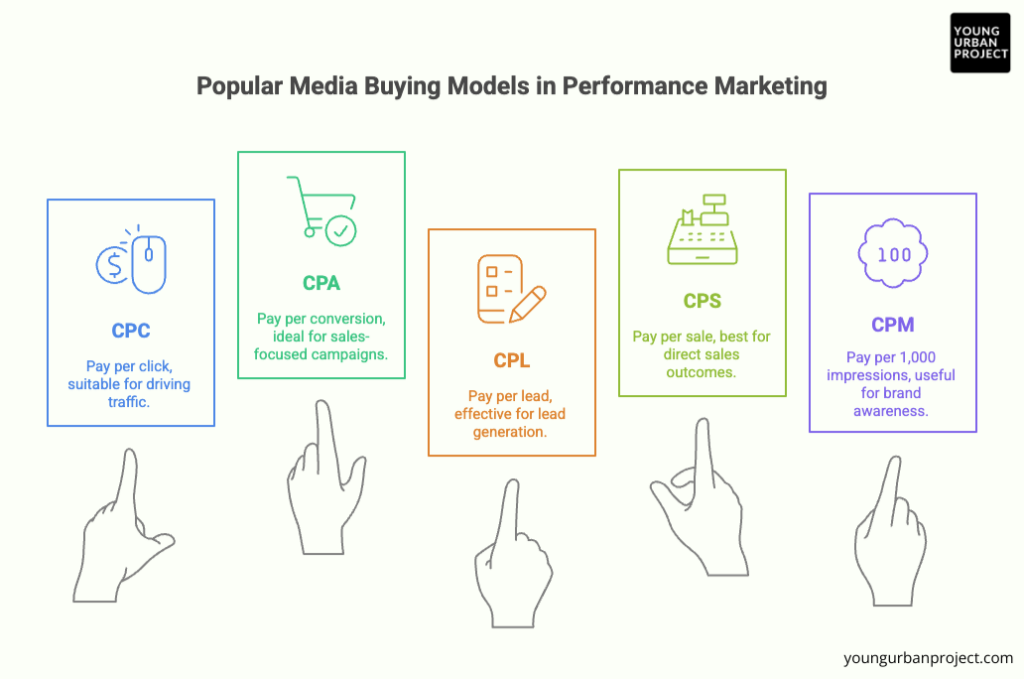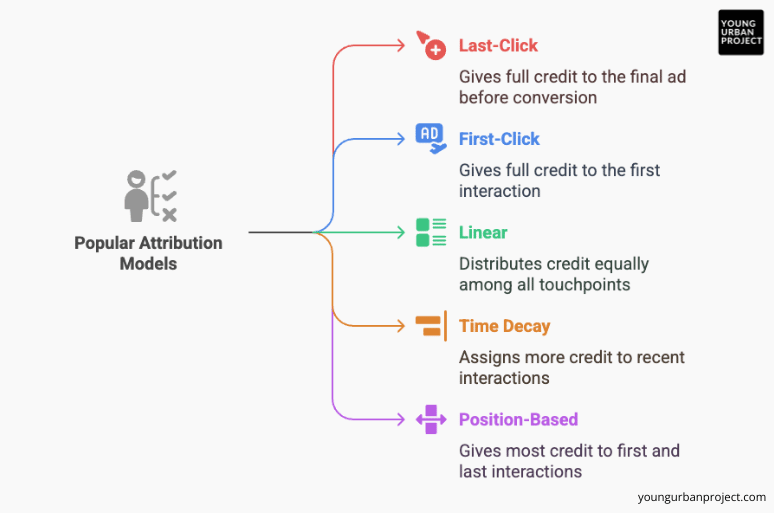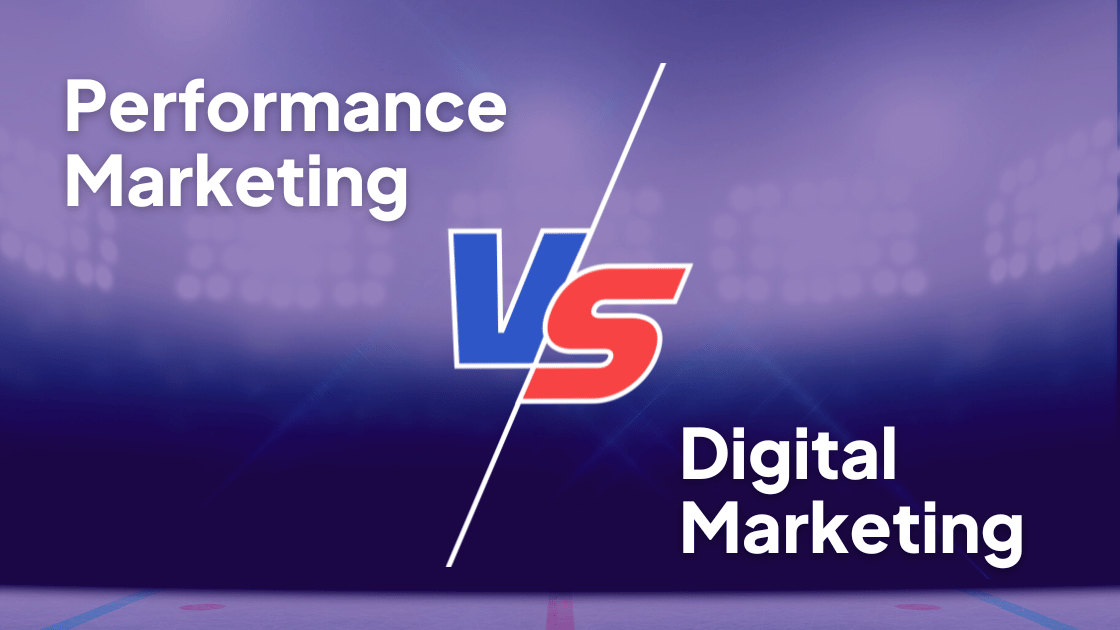Today, marketing is no longer a one-size-fits-all game. Businesses are navigating a landscape that’s constantly shifting – from changing algorithms to evolving consumer behaviors. Amid this flux, two terms get thrown around a lot: Digital Marketing and Performance Marketing. They often sound interchangeable, but they’re far from it. There is a distinct difference between Performance Marketing and Digital Marketing.
Understanding the nuanced differences between these two marketing approaches isn’t just about semantics – it’s about choosing the right tools for your business goals, allocating budgets effectively, building strong teams, and planning for both short- and long-term growth.
In this article, we will dive deep into what truly sets performance marketing apart from digital marketing, with real-world examples, career implications, data models, and emerging trends shaping the future.
Table of Contents
What is Digital Marketing?
Digital marketing is like the foundation of a skyscraper – it’s broad, essential, and designed to support long-term growth. It includes all marketing activities that use digital platforms to reach and engage customers.
From SEO that improves your website’s visibility on Google, to email marketing that nurtures relationships, digital marketing’s primary role is to build a brand’s presence and create demand over time.
Take, for example, a startup in the health and wellness space. They might:
- Use SEO to rank for queries like “best yoga poses for beginners.”
- Create YouTube videos that share tips on building a home workout routine.
- Post Instagram Reels about healthy eating habits.
- Send weekly emails to subscribers offering curated wellness content.
These marketing strategies don’t necessarily drive instant sales – and that’s okay. The point is to build trust, educate, and stay top-of-mind. Digital marketing is the long game.
Read Also: Top Marketing Channels for 2025
Channels in Digital Marketing
- SEO (Search Engine Optimization)
- Content Marketing
- Social Media (Organic)
- Email Marketing
- Video Marketing
- Mobile & SMS Marketing
- Influencer Collaborations
- Web Design & UX
Digital marketing is ideal for top-of-funnel (awareness) and mid-funnel (consideration) stages. It helps brands establish credibility, differentiate in crowded markets, and create lasting emotional connections.
Read Also: How does performance marketing work?
Performance Marketing: Where Every Click Counts
While digital marketing plays the long game, performance marketing is in the business of now. It’s the sharp end of the spear – designed to generate measurable results quickly. Think: leads, app installs, purchases, signups.
At its core, performance marketing is results-driven advertising. You pay when specific actions happen – not just for visibility. It’s all about ROAS (Return on Ad Spend), CPC (Cost Per Click), CPA (Cost Per Acquisition), and Conversion Rates.
Let’s say you’re running an e-commerce brand. A performance marketer would:
- Launch Facebook Ads targeting users who abandoned their cart.
- Set up Google Search Ads for high-intent queries like “buy running shoes online.”
- Use affiliate marketing where bloggers only earn commission when they drive a sale.
- Send retargeting emails to convert users who viewed a product but didn’t buy.
Every action is tracked. Every campaign is optimized. If it doesn’t convert, it doesn’t stay.
Read Also: Types of Performance Marketing Channels
Channels in Performance Marketing
- Google Ads (Search, Display, Shopping)
- Meta Ads (Facebook & Instagram)
- Affiliate & Partner Marketing
- Influencer Marketing (ROI-tied)
- Programmatic Advertising
- Email (Performance Campaigns)
- TikTok & LinkedIn Ads
Performance marketing owns the bottom of the funnel — converting warm leads and turning interest into action.

Checkout: Advanced Performance Marketing Bootcamp
Key Differences: Performance vs Digital Marketing
| Category | Digital Marketing | Performance Marketing |
|---|---|---|
| Goal | Awareness, branding, engagement | Conversions, sales, ROI |
| Focus | Long-term relationship building | Short-term measurable outcomes |
| Payment Model | Can include fixed costs, CPM, or time-based billing | Pay-for-performance (CPC, CPA, CPL, CPS) |
| Measurement | Broad KPIs (traffic, engagement, brand lift) | Direct KPIs (conversions, ROAS, CPA) |
| Timeframe | Months or years to see full impact | Immediate to short-term ROI |
| Funnel Role | Top and mid-funnel | Bottom-funnel and remarketing |
Read Also: Top Performance Marketing Tools to maximize ROI
Media Buying Models in Performance Marketing Explained
In performance marketing, advertisers only pay for measurable outcomes. The way you buy ad inventory is called a Media Buying Model or a Payment Model:
- CPC (Cost Per Click): You pay when someone clicks your ad.
- CPA (Cost Per Acquisition): You pay only when someone completes a conversion (like buying a product).
- CPL (Cost Per Lead): You pay when a lead form is filled out.
- CPS (Cost Per Sale): Payment only if a sale occurs.
- CPM (Cost Per Mille): Cost for 1,000 impressions (often used in awareness-focused digital campaigns).

Performance marketing’s financial model aligns perfectly with businesses seeking predictable ROI.
Read Also: How to Prepare a Performance Marketing Media Plan
Attribution & Data: Who Gets Credit for a Conversion?
Attribution determines how credit is assigned to different touchpoints in a buyer’s journey. This matters more than ever, especially with rising ad costs and evolving privacy laws.
Popular Attribution Models:
- Last-Click: The final ad before conversion gets 100% of the credit.
- First-Click: The first interaction gets all the credit.
- Linear: All touchpoints share equal credit.
- Time Decay: More recent interactions get more weight.
- Position-Based: The first and last get most of the credit; middle touchpoints share the rest.

Performance marketers rely heavily on attribution to scale campaigns efficiently. But with the demise of third-party cookies, the game is shifting. Brands are moving toward:
- First-party data strategies
- Server-side tracking
- Predictive attribution models powered by AI
Read Also: Performance Marketing & Paid Advertising Key Differences
Campaign Example: Where Digital and Performance Marketing Magic Happens
Brand do not work in a this-or-that fashion. They work with both Digital marketing and Performance marketing strategies as a part of their customer acquisition and retention process. Let’s walk through a hybrid campaign for a D2C skincare brand (let’s say it is The Minimalist – a skincare brand from India):
- Phase 1 (Digital Marketing): Launch a video series on YouTube and Instagram educating users on “how to deal with oily skin.” Drive organic engagement.
- Phase 2 (Digital/Performance): Run targeted Google Ads and Instagram Ads promoting a new oil-control product. Ads optimized for clicks and conversions.
- Phase 3 (Performance): Retarget viewers with email and Meta Ads offering a 15% discount to first-time buyers.
- Phase 4 (Digital): Use email nurture sequences and loyalty programs to increase LTV (Customer Lifetime Value).
This strategy blends both worlds – building brand equity while driving measurable sales.
Read Also:Is Performance Marketing a Good Career in 2025?
Career Paths: Creatives vs. Analysts
Marketing is no longer siloed into “the creatives” and “the numbers people” – but the skill sets required in digital and performance marketing do diverge significantly. Each path offers a distinct mindset, focus area, and professional growth trajectory.
🧠 Digital Marketing Careers: The Strategists and Storytellers
Digital marketing professionals are often the voice of a brand. They build narratives, create content ecosystems, and use strategic insights to drive engagement across various channels.
Common Roles:
- Content Strategist: Crafts editorial plans and oversees blogs, videos, and long-form content to build organic visibility and trust.
- SEO Manager: Optimizes web content and structure to improve search engine rankings and drive organic traffic.
- Social Media Lead: Oversees brand presence across social platforms, balancing engagement with growth metrics.
- Brand Marketer: Focuses on messaging, positioning, and overall brand perception across channels.
- Email Campaign Manager: Develops and executes email flows for nurturing, reactivation, or announcements.
Core Skills:
- Storytelling and narrative structure
- Content creation (visual, video, and written)
- Community building and engagement strategies
- Understanding user psychology and buyer personas
- Platform familiarity (WordPress, Canva, HubSpot, SEMrush)
Career Growth Path: Digital Marketing Executive → Senior Digital Marketer → Digital Marketing Manager → Head of Marketing → CMO
Industries Best Suited For:
- SaaS
- Healthcare
- Education
- B2B and agency settings
These professionals excel at creating long-term impact. While not always directly tied to revenue, their efforts shape brand equity and customer loyalty over time.
📊 Performance Marketing Careers: The Growth Hackers and Data-Driven Optimizers
Performance marketers are laser-focused on outcomes. Their world revolves around performance metrics, experiments, and optimization. They live in dashboards — not in Canva. Every campaign is built to scale.
Common Roles:
- PPC Specialist: Manages paid ad campaigns across Google, Bing, or social platforms.
- Paid Media Buyer: Plans and executes high-budget media campaigns across multiple platforms.
- Growth Marketer: Blends analytics with creative experimentation to drive scalable growth.
- Retention Manager: Focuses on keeping users engaged and increasing LTV using remarketing, email, and personalization.
- CRO (Conversion Rate Optimization) Specialist: Continuously tests and tweaks landing pages, CTAs, and funnels to maximize conversions.
Core Skills:
- Performance analytics and ROI modeling
- A/B testing and conversion funnel design
- Media buying and bid strategy
- Attribution and pixel tracking
- Proficiency in tools like Google Ads, Meta Business Manager, GA4, Mixpanel, Segment
Career Growth Path: Performance Marketing Executive → Growth Marketer → Head of Growth → Performance Director → Growth CMO
Industries Best Suited For:
- eCommerce
- Fintech
- B2C tech startups
- Lead generation companies
Performance marketers are often on the revenue frontlines. They’re rewarded for outcomes, not effort. If you’re someone who loves seeing the impact of your work in numbers, this is your lane.
Bridging the Gap: A Hybrid Future of Digital Marketing & Performance Marketing
While these career paths may seem divided, the most in-demand marketers today can straddle both worlds. A content marketer who understands A/B testing, or a media buyer who appreciates brand narrative, will have a serious edge.
While digital marketers craft the story, performance marketers ensure the story sells – and in a world of AI and automation, both must learn to speak each other’s language.
Pros & Cons of Performance Marketing vs Digital Marketing
Every marketing approach has its strengths and trade-offs. Choosing the right path depends not only on your business goals, but also on your available resources, timelines, and audience behavior. Here’s a more detailed breakdown of the pros and cons of each strategy:
| Aspect | Digital Marketing | Performance Marketing |
| Pros | Builds long-term brand equity and trust• Supports SEO and organic growth• Versatile for multiple industries and goals• Fosters community and customer loyalty• Provides creative freedom for storytelling | Data-backed decision-making and real-time optimization• Delivers fast, measurable ROI• Pay only for desired actions (clicks, leads, sales)• Easier to test and scale campaigns• Highly targetable with advanced audience segmentation |
| Cons | Requires a longer timeline to show results• Success is harder to attribute directly to revenue• May be deprioritized during cash flow crunches• Needs ongoing content creation and engagement• ROI can be more qualitative than quantitative | Can lead to short-term thinking focused only on sales• Often neglects brand-building and storytelling• Requires constant budget input to stay effective• High competition in bidding can drive up costs• Burnout risk from always chasing conversion metrics |
The Future: Performance-Driven Creativity
With AI transforming campaign optimization, the distinction between brand and performance will blur even more.
Emerging trends to watch:
- AI-generated creatives tested in real-time
- Predictive targeting based on first-party data
- Shoppable content merging social and commerce
- Full-funnel automation
Performance marketers will need to be storytellers. And digital marketers will need to speak the language of data.
Final Word
Digital marketing and Performance marketing aren’t rivals – they’re partners in a full-funnel strategy. One builds brand love, the other drives business growth.
Smart brands don’t choose between them. They orchestrate both.
Whether you’re hiring a team, building a campaign, or choosing a career – knowing the difference empowers you to make the right decisions.
Also, make sure to Follow us on Instagram and Subscribe to our Youtube channel for daily value-loaded content.
FAQs
Is performance marketing part of digital marketing?
Yes. Performance marketing is a subset of digital marketing. While digital marketing includes all online marketing tactics, performance marketing focuses specifically on campaigns where results are measurable and payment is based on action.
Can small businesses benefit from performance marketing?
Absolutely. Performance marketing allows small businesses to control budgets and pay only when they get results, making it a cost-efficient choice for startups with limited resources.
How long does it take to see results from digital marketing?
It depends on the strategy. SEO and content marketing may take 3-6 months to show strong results, while social media and email campaigns can generate engagement more quickly. Digital marketing is generally a long-term investment.
Which strategy is better for brand awareness?
Digital marketing excels at building brand awareness through content, social media, and SEO. Performance marketing, on the other hand, is better at driving conversions once awareness has been established.
Do performance marketers need to understand creative strategy?
Increasingly, yes. As the industry moves toward integrated campaigns, performance marketers who understand messaging, design, and storytelling can create more compelling, high-converting ads.
Can one person manage both digital and performance marketing?
In smaller teams, yes – especially if they have a T-shaped skill set. But as businesses grow, specialization is key to scaling each function effectively.

